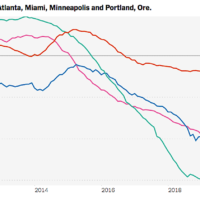
Increasing Urbanization Contributes to Racial and Gender Pay Inequality, Study Shows Newly published research finds that an 'urban wage premium' in large cities primarily benefits white and male workers
Researchers who study cities have long documented an “urban wage premium,” whereby workers in denser, larger cities tend to have higher wage and salary incomes. But a new study by a UCLA scholar is providing fresh insight into how growing population density in urban areas contributes to pay inequalities by race and gender.
In research published this month in the Journal of Urban Affairs, Max Buchholz, a postdoctoral researcher working with Professor Michael Storper of the UCLA Luskin School of Public Affairs, shows that this wage premium primarily benefits white and male workers, with significantly less positive impacts for Black workers, and possibly none for Latino and female workers.
Furthermore, gender-based wage inequality related to urbanization tends to be significant between men and women who have children but relatively insubstantial between men and women without children.
“My findings suggest there is something about cities that makes it particularly difficult for women to manage the dual responsibilities of child care and having a career,” Buchholz said.
He also looked at the constraints and tradeoffs that arise when urban workers balance employment opportunities with choices about housing quality and affordability, commuting and other activities. These “congestion costs” have been shown to have negative impacts disproportionately borne by women and people of color.
In particular, Buchholz found that the relationship between density and pay inequality became stronger when commute times to and from work also increased. Moreover, as urban areas get denser, commute times for Black workers and Asian American and Pacific Islander workers increase relative to white workers. But female–male commuting inequality decreases.
“This suggests that rising density doubly disadvantages Black workers with relatively lower wages and longer commutes, prompts AAPI workers to commute longer for pay that is equal to white workers, and constrains women’s access to jobs that suit their skills and qualifications,” Buchholz said.
The research was supported by a postdoctoral research fellowship from the National Science Foundation.









Leave a Reply
Want to join the discussion?Feel free to contribute!